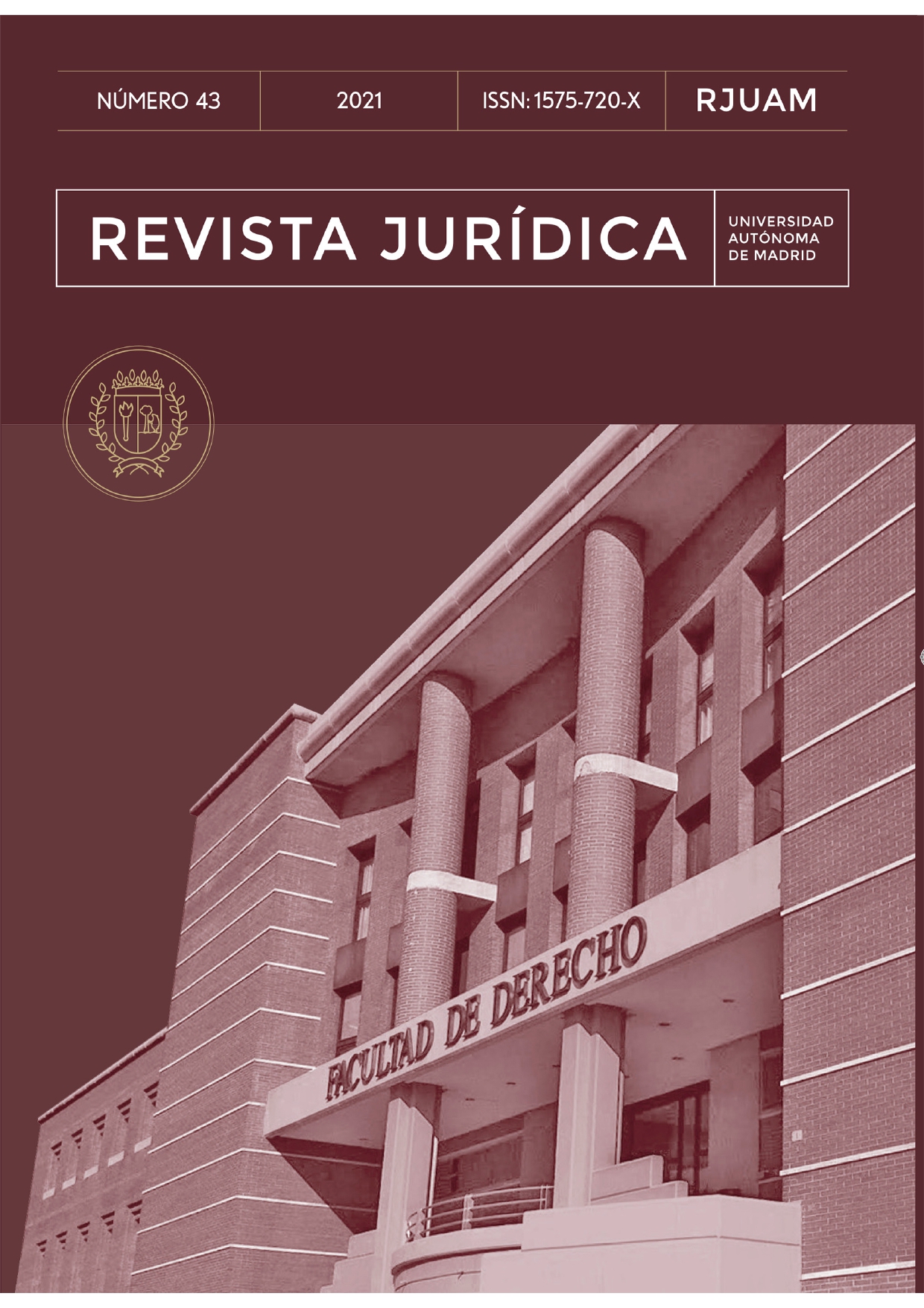A genealogical approach to the linkage between the languages of human rights and the environment in international relations
Keywords:
human rights, environmental protection, international regimes, genealogyCopyright (c) 2021 Revista Jurídica Universidad Autónoma de Madrid

This work is licensed under a Creative Commons Attribution-NonCommercial-NoDerivatives 4.0 International License.
Abstract
This essay investigates the growing interrelation of international norms regarding human rights and environmental protection, through the analysis of social vindications and other specific discursive strategies constructed by multiple international actors. Through the construction of a particular genealogical approach, and taking into consideration specific dynamics in the international space, two interdependent and simultaneous processes will be analysed: the introduction of the environmental dimension in human rights agendas, institutions, and juridical instruments; and the adoption of a language in terms of fundamental rights within the international regime of environmental protection. The focus will be centred on the transformative role of a series of non-hegemonic actors in the International Relations studies, that are identified as the main drivers of the growing interrelation between human rights and the environment normative and discoursive structures.
Downloads
References
BARNETT, M. & FINNEMORE, M., «The power of liberal international organizations», en Barnett, M., & Duvall, R. (eds.). Power in global governance, vol. 98, Nueva York (Cambridge University Press), 2005, pp. 161-184.
BOYLE, A., «Human Rights and the Environment: Where Next?», The European Journal of International Law, vol. 3, n.º 3, 2012, pp. 613-642.
BRYSK, A., «From Above and Below: Social Movements, the International System, and Human Rights in Argentina», Comparative Political Studies, vol. 26, n.º 3, 1993, pp. 259-285.
CAMERON, E. y LIMON, M., «Restoring the Climate by Realizing Rights: The Rile of the International Human Rights System», Review of European Community & International Environmental Law, vol. 21, n.º 3, 2012, pp. 204-219.
CAMPOS, A., «Derechos Humanos y Empresas: un enfoque radical», Relaciones Internacionales, n.º 17, GERI - UAM, 2011, pp. 41-64.
CUADRO, M., «El post-estructuralismo en las RRII: una perspectiva alternativa» en LLENDERROZAS, E. (coord.), Relaciones Internacionales: teorías y debates, Buenos Aires (UEDEBA), 2013, pp. 107-133.
DE SOUSA SANTOS, B., Para descolonizar Occidente, Más allá del pensamiento abismal, Buenos Aires (UBA Sociales Publicaciones CLACSO), 2010.
DILLON, S.T., «Discourse, genealogy and methods of text selection in international relations», Cambridge Review of International Affairs, vol. 31, n.º 3-4, 2018, pp. 344-364.
DIXON, J. M., «Rhetorical Adaptation and Resistance to International Norms», Perspectives on Politics, vol. 15, n.º 1, 2017, pp. 83-99.
DONALD, A. y SHELTON, D., «The Environment as a Human Rights Issue», en DONALD, A. y SHELTON, D., Environmental Protection and Human Rights, Nueva York (Cambridge University Press), 2011, pp. 118-150.
DONELLY, J., «La construcción de los derechos humanos», Relaciones Internacionales, n.º 17, GERI-UAM, 2011, pp. 153-184.
FINNEMORE, M. y SIKKINK, K., «International Norm Dynamics and Political Change», International Organization 52, 4, 1998, pp. 887–917.
FRIENDS OF THE EARTH INTERNATIONAL, «Our Environment, Our Rights. Standing Up for People and the Planet», 2004. Disponible en: <https://www.foei.org/wp-content/uploads/2014/07/our-environment-ourrights.pdf>. [Consultado el 27/06/2020].
GEARTY, C., «Do human rights help or hinder environmental protection?», Journal of Human Rights and the Environment, vol. 1, n.º 1, 2010, pp. 7-22.
GUPTA, J., «A history of international climate change policy», WIREs Climate Change, vol. 1, 2010, pp. 636-653.
GUZZINI, S., «The ends of International Relations Theory: Stages of reflexivity and modes of theorizing», European Journal of International Relations, n.º 19 (3), 2013, pp. 521-541.
KECK, M. y SIKKINK, K., «Redes transnacionales de cabildeo e influencia», FI XXXIX-4, Traduc. MURILLO, L., 1999, pp. 404-428.
KEELEY, J., «Toward a Foucauldian analysis of international regimes», International Organization, vol. 44, 1990, pp. 83-105.
LEWIS, B., Environmental Human Rights and Climate Change, Singapore (Springer), 2018.
ONU, «Declaración de la Conferencia de las Naciones Unidas sobre el Medio Humano», Estocolmo, doc. A/CONF.48/14/Rev.1, 1972, disponible en: <https://undocs.org/sp/A/CONF.48/14/Rev.1>. [Consulta el 08/06/2020].
RISSE, T. y SIKKINK, K., «The socialization of international human rights norms into domestic practices: introduction», en RISSE, T.; ROPP, S. C. y SIKKINK, K. (eds.), The Power of Human Rights: International Norms and Domestic Change, Nueva York Cambridge (Cambridge University Press), 1999, pp. 1-38.
RODRIGUES, T., «Agonismo y genealogía: hacia una analítica de las Relaciones Internacionales», Relaciones Internacionales, GERI-UAM, n.º 24, 2013, pp. 89-107.
ROTHSCHILD, R., «Deténte from the Air: Monitoring Air Pollution during the Cold War», Technology and Culture, vol. 57, n.º. 4, 2016, pp. 831-865.
RUIZ-GIMÉNEZ, I., «Luces y sombras del régimen internacional de los Derechos Humanos. Setenta años de luchas por expandir sus significados», Papeles de relaciones ecosociales y cambio global, n.º 142, 2018, pp. 43-53.
VARGAS, D. U.; CASTAÑEDA, F. A. & GARCÍA, F. C., Derecho internacional ambiental, Bogotá (Fundación Universidad de Bogotá Jorge Tadeo Lozano), 2010.
VUCETIC, S., «Genealogy as a research tool in International Relations», Review of International Studies, vol. 37, 2011, pp. 1295-1312.
